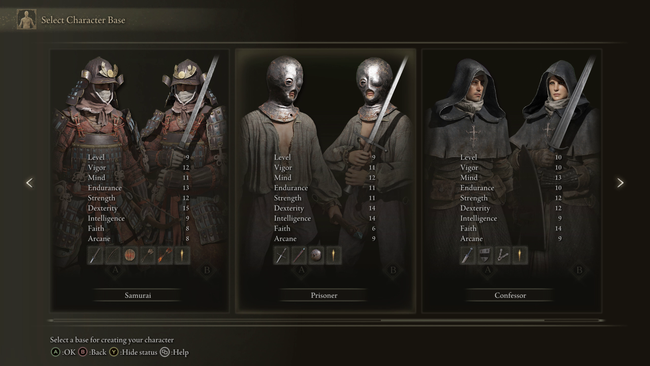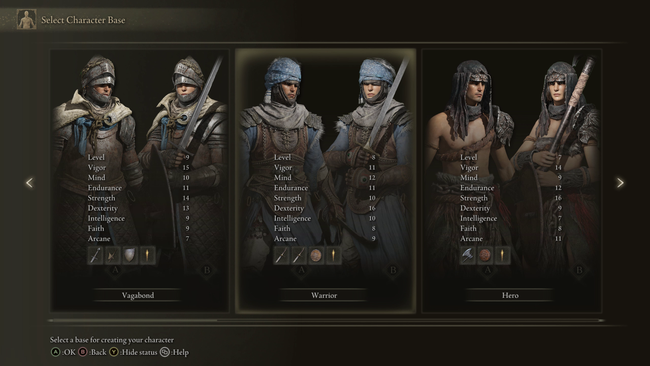
Elden Ring Class Guide: classes explained, and choosing the best one
Elden Ring has starting classes that mirror many tropes and traditions of the RPG genre - but as is the case with all of FromSoftware's Souls-style action RPGs, how it impacts your play-through is a complicated affair that isn't anywhere near as rigid as in many other RPGs.
In this Elden Ring Classes guide, we explain all of the classes in the game, plus offer some suggestions about how to answer the question of what the best class in Elden Ring is. If you're sitting on the character creation screen paralyzed, struggling to make a decision about what sort of character to play, the simple information run-down presented on this page should give you a pretty good idea of what direction you'll want to go in. So... let's get to it.
What’s the best class in Elden Ring?

Well, dear reader - that’s a loaded question. Is there a Best Class in Elden Ring? Is such a thing even possible? Well, yes and no. Let us explain what we mean.
Elden Ring is an extraordinarily open game - that’s why we’ve advised people to think about taking notes while playing. What that means is that you can totally pick any class and you’ll make it work.
There is no right or wrong choice, and ultimately, your starting class choice won’t matter much - as you’ll be able to spec your character in a different direction over time, as you level up. You'll also be able to lean into your strengths or lessen your weaknesses later on through equipping a Great Rune and using a Rune Arc.
You also unlock the ability to respec once you get deeper into the Lands Between, but even if you respec, your base stats from your starting class will stay with you forever. This means your character class choice isn't a huge deal, but it matters more than your Keepsake starting gift items; as you get the chance to get the others of those later.
With that being said, your opening choice of character class, or Origin as it’s called in Elden Ring, will dominate your early hours with the game. It’ll also give you a starting point for your character build. Some are easier early on than others, too. What class you are will determine stuff around what you chase, too - like there's little point chasing the loot beind the Converted Tower Erudition puzzle side quest if you're not a mage, for instance.
With all that said, here's some notes on the Best Class in Elden Ring, in line with those thoughts:
- You’ll have a clear choice between a Melee, Magic, or Hybrid class. Think about what type of casting you want to do - be that not at all, full-blown spells, or just Spirit Ashes Summons, which are items but require FP to cast. If you choose a pure melee class with super-low magic stats, you’ll have to climb a hill to build those stats up to use magic later on.
- Some classes are simpler to use than others. The Vagabond is a solid all-around Melee class, for instance, with a simple play-style. The Astrologer is likewise for magic.
- The Confessor is the closest thing Elden Ring has to an ‘easy mode’ class, and so if you’re a beginner, it’s definitely the best starting class. It comes with a wider range of equipment, and is an all-rounder that is a little bit good at just about everything; a jack-of-all-trades, and master of none. The advantages of it melt away as the game wears on, but early on the Confessor is a bit of a beast.
With that noted, let’s get into descriptions of each class to help you made an informed decision during character creation.
Elden Ring Class Guide: all classes explained

Here it is; our descriptor of all ten starting classes in Elden Ring. Below, we list the starting gear, level, and notable stats of each class - plus a little description to help clue you in so you can choose the best class for the type of Elden Ring player you’re about to be. Good luck, Tarnished.
Vagabond
- Starting Equipment: Longsword, Halberd, Heater Shield
- Starting Level: 9
- Notable Stats: Vigor (high), Arcane (low)
Consider the Vagabond the archetypical Knight class in Elden Ring. They come equipped with two different weapons - a sword for closer-range and a far-reaching Halberd - and come equipped with a shield that can absorb 100% of damage in exchange for a hit to your Stamina - something which every other shield-using class will have to find out in the world later on.
It’s arguably one of the most simple classes to understand: you armor up, attack, block, dodge, and melee battle your way to victory. It has a strong Vigor stat, which governs HP, as a result. It’s all about melee.
However, the Vagabond also comes with three of the lowest starting stats for Intelligence, Faith, and Arcane - meaning this class has a way to go to be able to use any magic, including all but the most rudimentary Spirit Ashes Summons.
Warrior
- Starting Equipment: 2x Scimitar, Buckler
- Starting Level: 8
- Notable stats: Dexterity (high)
If the Vagabond is a Knight, the Warrior is a lighter, more noble version of it - less heavily armored, and with less proficiency in heavy weapons, exchanging force for finesse - something matched in this class having the highest Dexterity Stat of any class in the game - a stat that primarily governs how well you can use more complicated armaments.
The Warrior comes equipped with a small shield, but it's starring great is a pair of Scimitars - fast swords that can be dual-wielded to overwhelm enemies. If fast but a little more squishy appeals to you, the Warrior is a decent melee alternative to the Vagabond.
Hero
- Starting Equipment: Battle Axe, Leather Shield
- Starting Level: 7
- Notable Stats: Strength (high), Mind/Dexterity/Intelligence (low)
The Hero goes the opposite way to the Warrior, putting it at one extreme end of a spectrum that the Vagabond sits in the middle of. It has a sky-high Strength stat, and is built entirely around brute force. While the Vagabond will be able to use some rudimentary spells and summons, the Hero is even less attuned to magic - or even to high-complexity weapons.
Instead, it’s all about strength - the Hero is meant to be a tank, chopping through things with brute force and ignorance. This is the sort of class that excels when you put your back into it and 2-hand weapons for extra brute power.
Bandit
- Starting Equipment: Shortbow, Knife, Buckler
- Starting Level: 5
- Notable Stats: Arcane (high)
There’s actually two classes that are a little like a ranger in Elden Ring, but I suppose that if you really want a traditional RPG class comparison, the Bandit plays a lot like a Thief - even though there’s no theft mechanic in this game.
What that means is that the Bandit excels off backstabs and critical hits, thus it coming equipped with light armor and two very disparate weapons - a bow for long-range combat and a Knife for up close, personal assassinations.
It has quite balanced stats, and curiously its highest natural stat is in Arcane, which raises your chance of finding items on defeated enemy corpses - which I guess makes it more of a thief after all.
Astrologer
- Starting Equipment: Astrologer’s Staff, Short Sword, Small Shield, 2 Sorceries (Glinstone Pebble & Glintstone Arc)
- Starting Level: 6
- Notable Stats: Mind/Intelligence (high), Vigor (low)
Though there isn’t an enormous amount in it, we’d argue that the Astrologer is the ‘default’ mage class in Elden Ring, just by virtue of how it plays - it’s 100% focused on spell-slinging, as the default equipment it comes with shows. It does have a basic sword and shield for when things get really hairy, however.
As you’d expect, the Astrologer comes with a very high Mind stat, which paired with Intelligence means it can cast spells more frequently and effectively than any other starting class. However, it’s a very limited class to start with - and is particularly vulnerable.
Prophet
- Starting Equipment: Spear, Finger Seal, Rickety Shield, Incantations (Heal, Oh, Flame!)
- Starting Level: 7
- Notable Stats: Faith (high), Endurance/Dexterity/Intelligence (low)
The true believer class, FromSoftware has deigned to give the class built around belief in the religious the lowest Intelligence stat. What that means in real terms in-game is that while the Astrologer is built around glintstone sorceries, this class is instead focused on Incantations.
Many incantations scale with Faith, meaning that the Prophet is extremely powerful - but only when performing that specific type of spell. We think it’s arguably the more difficult of the two pure mages to master out of the gate.
Samurai
- Starting Equipment: Uchigatana sword, Long Bow, Red Thorn Roundshield, Fletched Arrows (Bone & Firebone)
- Starting Level: 9
- Notable stats: Endurance (high)
Back to melee classes for a moment, we mentioned earlier that the Bandit was more like a Thief than a Ranger - well, that’s because the Samurai is basically Elden Ring’s Ranger-style class, coming with a Longbow, plus decent equipment for up-close battles.
The Samurai does come with a shield, though really its default Katana weapon renders that fairly useless, as it’s designed to be best used two-handed. It comes with both regular and fire-elemental arrows, and you’ll be able to craft more arrows from very early in the game. It’s arguably the most versatile of any of the melee starting classes.
Prisoner
- Starting Equipment: Estoc Sword, Catalyst Staff, Iron Roundshield, Magic Glintblade Sorcery
- Starting Level: 9
- Notable Stats: Faith (low)
You might notice that in our listing above the Prisoner only has one stand-out stat, and it’s a low one. That doesn’t mean this class is bad, though - it just means it’s balanced, with otherwise middle-of-the-road stats across the board.
That makes sense, as this is a hybrid class - halfway between the Vagabond or Warrior and the Astrologer. It comes equipped with a basic sword and shield, plus a single sorcery, and magic stats decent enough to cast a range of glintstone spells right out of the gate.
Confessor
- Starting Equipment: Broadsword, Kite Shield, Finger Seal, Incantations (Urgent Heal, Assassin Approach)
- Starting Level: 10
- Notable stats: Even across the board
Despite really quite liking the Prisoner, there is a more powerful hybrid starting class out of the gate - and that’s the Confessor. The Confessor has it all - no major stat drawback, and a little bit of everything. It might be the best class for beginners in the game.
A little bit of everything means, well, just that. It’s the highest starting level, and it can do everything - spells, incantations, and attacks with a hefty broadsword. If you take lots of damage, it even comes with a nice healing incantation right from chargen.
Wretch
- Starting Equipment: Club
- Starting Level: 1
- Notable Stats: Even across the board
The Wretch is the ‘hard mode’ class. You start naked, and with only a club for a weapon. You also start at Level 1, with an even stat of 10 points across each of the stat categories Elden Ring offers.
The idea behind this is that it’s a blank-slate class: you can build however you want. However, it also means that you start out completely vulnerable, and have to cobble together equipment as you go. It’s an awesome way to play - but it’s definitely not for the faint of heart.